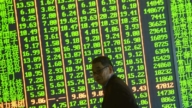【新唐人2014年04月11日讯】在国际货币基金组织与世界银行和G20会议,本周在华盛顿召开之前,美国对急剧下跌的中国货币表示担忧,警告北京不要重回操纵人民币的老路。但是有分析认为,人民币贬值是中国经济下滑的结果。甚至有分析说,目前人民币已经估值过高。外媒也指出,人民币挑战美元霸主地位的预测落空。
一名美国财政部高级官员日前说,“如果最近的人民币疲软,预示着中共背离‘允许由市场决定汇率’的政策,这将引发严重担忧。”
自从2月份以来,人民币已经下跌2.5%,对于多年来缓慢而稳定上升的中国货币来说,这是一个急剧的转变。
美国的言论凸显了华盛顿担忧中共面对放缓的经济,将倾向于通过压低货币来刺激出口。这样的行动可能导致中国减少全球的市场需求,而此刻世界上几个地区比如欧洲都处于经济疲软。这反过来可能阻碍美国增长。
但也有分析认为,人民币俯冲而下是因为市场压力。一系列广泛的经济指标——从贸易到消费支出到工业产出——都显示放缓的中国经济,减少了对人民币的需求。
那么人民币下跌究竟是中共当局操纵的结果,还是中国经济下滑的自然结果?
北京天则经济研究所副所长冯兴元认为,人民币近期下跌有三个原因。第一是美国退出量化宽松,美元必然坚挺。第二,中国经济增长放缓,外界对它不看好。
天则经济研究所副所长冯兴元:“对你中国经济预期不大好的时候,包括中国的货币资本外逃会加强,他会倾向于到外头去投资。很多人会去买美元。美元就往上走。美元再通过某种方式流出国内。相对而言,人民币币值会往下走。”
人民币贬值的第三个因素是,长期以来人民币增发,导致国内物价增长比较快。
冯兴元:“如果长期的物价增长比较快的话,说明人民币内部币值稳定不行。内部币值稳定体现在国内物价上。内部币值不稳定、贬值的话,长远影响到外部币值不稳定。再长期的话,它会影响到人民币汇率的贬值。”
至于,中共政府是不是操纵汇率﹖冯兴元表示,在没有明确证据的情况下,不能随便评论。
而美国《华尔街日报》引述中共央行官员私下的说法﹕央行设计了最近的人民币下滑,以阻挠短线投机者,并引入更大的双向波动。
大陆经济学者巩胜利最近接受《新唐人》采访时表示,在人民币贬值初期,央行是为了阻击投机者,但是到后来,则是因为市场看衰中国经济而造成贬值。
英国《金融时报》4月8号报导,英国“郎伯德街研究所”估计,人民币已经高于公平价值的15-25%。而估值过高已经损害了企业盈利,过去两年企业盈利平平,在这个期间,企业债务相对GDP的比例已经飙升15个百分点。如果人民币缺乏进一步的贬值,企业将很难在不削减投资,和削减员工及薪资的情况下,维持资产负债表的平衡。
《金融时报》的报导说,走低的中国货币可能被证明是一个触发器,就像美国次级房贷触发了全球金融危机那样。
自从2010年以来,实际的和预期的人民币升值,催生了一个套利游戏。在外汇债务需要偿还的时候,下跌的人民币可能导致挤兑,推动资产价格下降。每次当局推出监管条例遏制套利,或最近当央行压低人民币的时候,市场流动性都承受压力。
此外,许多在国外筹集的资金,已经通过理财产品流入中国企业贷款,其中一些将变成坏账。大量的这类产品将在未来几个月到期,考验中国的金融系统,特别是如果北京不干预阻止违约发生的话。
就像美国的次贷危机一样,中国金融问题的规模萦绕着不确定的阴云。
《华尔街日报》4月8号报导说,人民币作为储存货币吸引力有限的原因是:中国金融系统太不稳了。更重要的是,美元的重要支柱是:透明的民主制度,政治制约和平衡,而这一切都是中共强烈抵制的。
采访编辑/秦雪 后制/钟元
U.S. Issues Warning to China on Economic Downturn and Devaluation of Renminbi (RMB)
A G20 meeting between the International
Monetary Fund (IMF) and the World Banks
will be held in Washington this week.
Prior to it taking place, the US has raised
concerns over the sharp drop in the RMB.
It warned the Beijing authorities not to
manipulate RMB as it has done before.
Some analysts believe that devaluation
is the result of China’s economic downturn.
Some suggest that the RMB has been overvalued.
Foreign media also point out the prediction of
challenges faced with the supremacy of the dollar.
A senior US Treasury official commented that, “if the recent
currency weakness signals a change in China’s policy away
from allowing adjustment and moving toward a market-
determined exchange rate, that would raise serious concerns.”
Since February this year, the RMB fell 2.5 percent.
This is a big change for the Chinese currency,
which has slowly but steadily risen over the years.
Remarks by the U.S. highlight Washington’s concern that
the Chinese Communist Party (CCP) will stimulate exports.
They will do this by depressing their currencies
in response to the economic slowdown.
Such action could reduce global market
demand from China to hamper US growth.
This is because several regions of the world,
such as Europe, are in a weak economy.
Some analysts believe the RMB floating
down is because of market pressure.
A series of wide economic data from trade, to consumption
expenditure, to industrial output, has shown a slowdown
in China’s economy, which has reduced RMB demand.
So what are the results of the RMB devaluation?
What will result from the Chinese authorities’ manipulation,
or the natural result of China’s economic downturn?
Feng Xingyuan, Deputy Director of the Beijing
Unirule Institute of Economics, believes there
are three reasons for the recent RMB devaluation.
The first is that the dollar will be inevitably strong,
because of the US quantitative easing withdrawal.
Second, overseas is not optimistic
on China’s economic slow growth.
Feng Xingyuan, Deputy Director, Unirule Institute
of Economics: “They will tend to invest out of China
if they don’t predict a good economy in China.
In addition, there has been an increase
in registered capital flowing out of China.
Many people buy dollars to make dollars up.
Dollars will go back to US in some
way and RMB will go down relatively.”
The third reason for RMB devaluation is the fast growth
of domestic prices, resulting from long-term RMB issuance.
Feng Xingyuan: “it indicated that the RMB internal currency
value is unstable if the price grows fast in the long term.
The internal currency value is reflected in the domestic price.
The unstable internal currency value will influence the
stability of the external currency value in the long-term
It will also influence the depreciation
of the RMB exchange rate further.”
Without clear evidence, it is not possible to comment
on whether the CCP government is manipulating
the exchange rate without clear evidence.
The Wall Street Journal has quoted
CCP central-bank official’s words.
Beijing considers the drop part of its effort to thwart
short-term speculators who see the yuan’s strengthening
as a sure bet but triggered greater two-way fluctuation.
China economist Gong Shengli recently spoke to NTD.
The early RMB devaluation is to thwart speculators
from the central bank; but the later devaluation is
because China’s economy is devalued by the market.
The Financial Times reported on April 8 that
Lombard Street Research estimates the RMB
is between 15 and 25 per cent above fair value.
Overvaluation has already hurt corporate
profits, which have been flat for two years.
Corporate debt as a share of GDP has surged
15 percentage points during that time.
This is while corporate deposits have hardly changed.
In the absence of further depreciation, it will be
hard for firms to keep taking a hit to their balance
sheets without slashing investment, jobs and wages.
China’s currency could turn out to be a
trigger, in the same way that US sub-prime
mortgages sparked a global financial crisis.
But the actual and expected rise in the RMB has
spawned an arbitrage game, since the middle of 2010.
A lower RMB could cause a scramble
for liquidity, pushing asset prices down.
This is when debts in foreign currency need to be repaid.
Every time the CCP has introduced regulations
to curb arbitrage – or more recently when the
People’s Bank of China pushed down the RMB
– market liquidity has come under pressure.
In addition, a lot of the money raised abroad
has been funneled via wealth management
products into Chinese corporate loans.
Some of these will turn sour.
A large number of such products
will mature in the next few months.
This will test the system, especially if Beijing does
not intervene to prevent defaults, as it did in January.
Much like sub-prime lending in the US, China’s
financial problems are clouded in uncertainty.
The Wall Street Journal reported that on
April 8, for precisely the reason that limits
the attractiveness of the yuan as a currency
haven: China’s financial system is too shaky.
Prasad points out America’s transparent system
of democracy, political checks and balances, and
the rule of law to which even the executive is subject.
These are all concepts that the current Chinese
administration, under President Xi Jinping, emphatically rejects.
Interview & Edit/Qin Xue Post-Production/Zhong Yuan



























